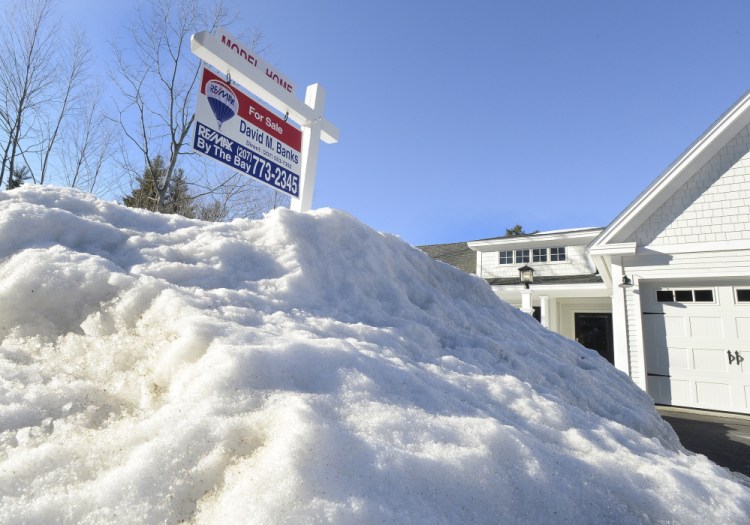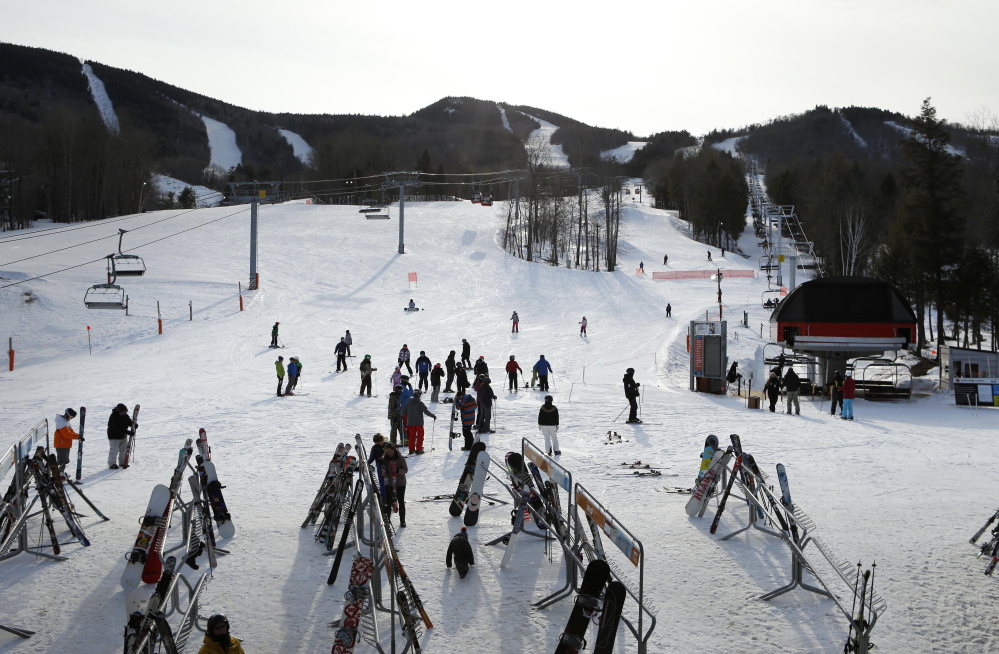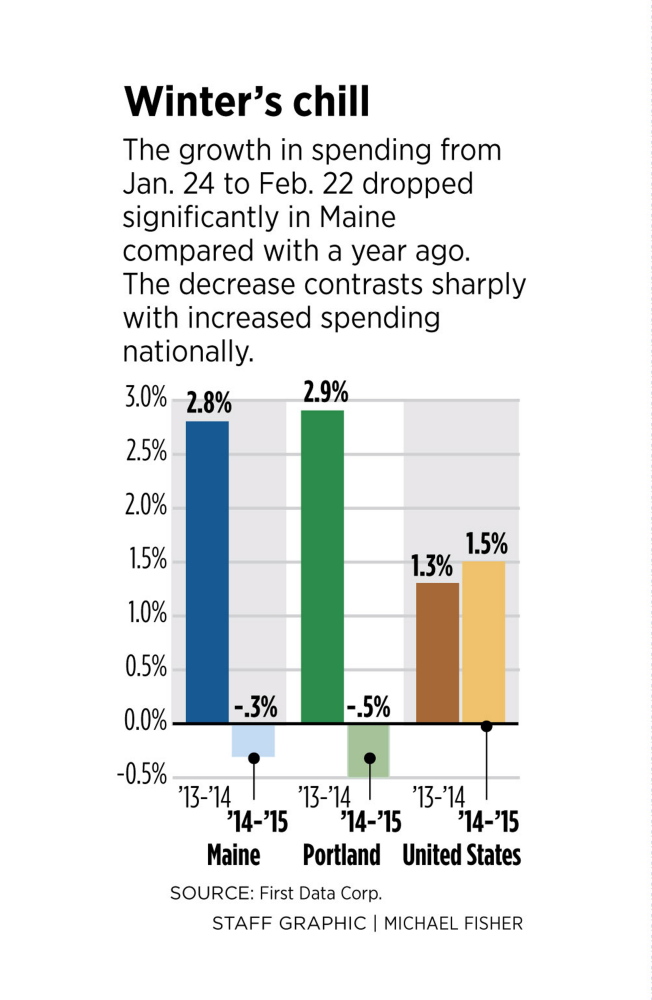A record-breaking month of severe cold and heavy snowfall that began in late January caused an economic downturn throughout the state, as most Mainers chose to sit out the weather at home.
Consumer spending during the stormy period from Jan. 24 through Feb. 22 took a nosedive, flipping from 2.8 percent year-over-year growth in 2014 to a 0.3 percent decline, according to a data analysis done for the Press Herald by Atlanta-based First Data Corp., which processes nearly half of all credit and debit card transactions nationwide. The situation was even worse in Portland, where spending went from a 2.9 percent increase in 2014 to a 0.5 percent decline, it said.
The figures for Maine’s taxable retail sales in January and February are not yet available, but in February 2014 they totaled $1.15 billion, according to Maine Revenue Services. Based on that figure, a 0.3 percent decline would mean a loss of about $3.4 million for businesses in the state, in addition to whatever year-over-year sales growth they otherwise might have achieved.
Nearly all businesses lost revenue as a result of the bad weather, First Data said, including retailers, restaurants, hotels and car dealerships. Only grocery stores saw a bump in sales, it said. Ski resorts also reported better-than-average business because of the ample snow.
The Portland International Jetport recorded snowfall on 19 of the 30 days from Jan. 24 to Feb. 22. The single worst weather event was a Jan. 27 blizzard that dropped more than 2 feet of snow on portions of the state. Other, less severe snowstorms followed in close succession on Jan. 30 and Feb. 2. Meanwhile, temperatures dropped into the single digits or below on 22 of the 30 days. February’s average temperature of 13.8 degrees was the coldest on record for Portland.
“The storms, particularly at the end of January and February, were just awful,” said Kai Smith, co-founder of Portland-based gift card provider Buoy Local, which focuses on independently owned local businesses.
Frigid temperatures and snow-filled parking spaces conspired to keep many customers away from businesses in downtown Portland, Smith said. Meanwhile, similar scenarios played out across the state.
“There is no question that storms of this magnitude and frequency have a disruptive effect on sales volumes,” said Thomas Brown Jr., president of the Maine Automobile Dealers Association. “People were busy either hunkering down or shoveling out.”
Like other businesses, auto dealers had a rough month, Brown said. However, prospective customers who opted not to buy during the stretch of bad weather should be showing up at dealerships now that it’s over, he said.
“Generally it just delays things,” Brown said. “Vehicles aren’t exactly an impulse buy.”
PENDING HOME SALES WERE DOWN
Home sales activity also took a hit in February, according to a report issued Wednesday by RE/MAX of New England.
Pending home sales in Maine were down 4.1 percent compared with a year earlier, the report said, and total transactions, which include the closings of pending sales for prior months, were down 1.2 percent. However, the median sale price of homes in Maine increased 5.1 percent from February 2014, it said.
Realtor David Banks of RE/MAX by the Bay in Portland said home sales are likely to rebound now that the weather is improving. Homes on large lots have been particularly hard to show to prospective buyers “unless you have snowshoes,” he said.
The harsh weather conditions also put a damper on new home construction, Banks said.
“It’s just so cold and so much snow,” he said.
The jetport lost business as a result of the bad weather, said Paul Bradbury, the airport’s director. In February, 10.7 percent of all scheduled flights were canceled, and 5.5 percent of passengers scheduled to pass through the jetport were turned away, he said.
“We are very much weather-dependent,” Bradbury said, adding that some flights were canceled because of poor weather at connecting destinations, or in anticipation of local storms that did not materialize as predicted.
Since the jetport’s revenue tracks evenly with passenger counts, it lost 5.5 percent of its potential business as a result of the cancellations, he said.
Heavy and frequent snowfall also caused problems for businesses in Maine that rely on shipments by rail. Rail operators said in late February that they were struggling to keep up with customer demand for freight shipments because cold weather and snowfall caused problems for trains. They had to clear tracks of snow frequently and run shorter trains because extreme cold makes their brakes less effective.
Retailers, restaurants and hotels all suffered as a result of the cold and snowstorms, said Rishi Chhabra, vice president of information and analytics at First Data, which processes card payments for more than 80,000 New England businesses.
“If you look at the U.S. overall, the number has actually gone up,” Chhabra said about year-over-year growth in consumer spending during the stormy month. “In the whole New England area, the growth rates actually have gone down.”
There is an obvious correlation between sales activity and weather, he said. Consumers are less likely to leave their homes and spend money at businesses when it is bitter cold and snowing.
“It limited traffic for retail a lot,” Chhabra said. The only notable exception was grocery stores, which experienced a bump in sales with customers stocking up for storms and preparing a higher-than-average number of meals at home, he said.
VALENTINE’S DAY RETAIL HIT HARD
Craig Gorris, general manager of The Maine Mall in South Portland, said the timing of winter storms makes a big difference to retailers at the mall.
Snowstorms in January, February and March have a notably chilling effect on sales, Gorris said. However, when they hit in November or December, Mainers come out to shop anyway, he said.
“During the holiday shopping season, there’s more urgency to get out there,” Gorris said.
But Curtis Picard, executive director of the Retail Association of Maine, said many of the association’s members have expressed relief that the heaviest storms didn’t hit Maine just before the holidays. He noted a severe ice storm at the beginning of the 2014 holiday shopping season that knocked out power to some retailers and caused a noticeable drop in sales statewide.
The businesses most severely affected by this year’s snowstorms were those catering to the Valentine’s Day crowd, Picard said.
“Candy sellers really got smacked by the weather,” he said.
One sector of Maine’s economy that benefited from the snow was the skiing industry, said Greg Sweetser, executive director of the Ski Maine Association.
Many resorts in the state are reporting that this winter has turned out to be one of the busiest seasons ever, he said. Still, customer traffic has been weaker during weekends with heavy snowfall, Sweetser said.
“If we could have waved a magic wand, we would have liked a couple more sunny Saturdays,” he said.
Megan Roberts, general manager of Farmington Ski Club at Titcomb Mountain, said the resort has been having a tremendous season despite the cold, wind and storms.
“On some of the more extreme days, we really did great business,” Roberts said. “The snow, of course, has been wonderful.”
Send questions/comments to the editors.







Success. Please wait for the page to reload. If the page does not reload within 5 seconds, please refresh the page.
Enter your email and password to access comments.
Hi, to comment on stories you must . This profile is in addition to your subscription and website login.
Already have a commenting profile? .
Invalid username/password.
Please check your email to confirm and complete your registration.
Only subscribers are eligible to post comments. Please subscribe or login first for digital access. Here’s why.
Use the form below to reset your password. When you've submitted your account email, we will send an email with a reset code.